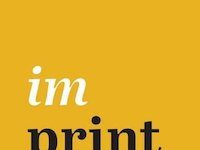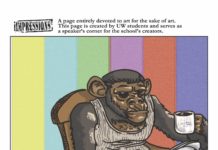The Balsillie School of International Affairs once again hosted the annual Wild Writers Festival at the Centre for International Governance Innovation campus in Uptown Waterloo Nov. 4-6.
Organized by The New Quarterly, a Canadian literary journal based at St. Jerome’s University, the fifth annual Wild Writers Festival offered a day of panel discussions, as well as writing workshops to interested participants and aspiring writers on topics as diverse as fantasy writing, detective fiction, the art of dialogue, writing a thriller, helpful memoir writing techniques, as well as a session on poetry appreciation.
There was also a special event on Saturday at Kitchener’s newly established restaurant, The Berlin, featuring music by The Light of East Ensemble (traditional, folk, and Classical Arabic music from Armenia, Greece, Turkey, Egypt, Lebanon, and Syria) as well as an on-stage interview with Zarqa Nawaz, the creator of CBC’s award-winning Canadian television sitcom, Little Mosque on The Prairie and author of Laughing All the Way to the Mosque.
The festival concluded on Sunday with a “literary brunch” featuring Canadian writers Madeleine Thien, Alissa York, and Michael Helm at the Rhapsody Barrel Bar restaurant in downtown Kitchener. It offered aspiring and novice writers a unique chance to discuss the writing process with them in an intimate, casual setting.
Pamela Mulloy, editor of The New Quarterly and Wild Writers Festival founder, said that “the sessions on Saturday were full to overflowing, and our other events were very well attended.”
Mulloy added, “The New Quarterly is a national, award-winning magazine with a great reputation across Canada, but hasn’t been as well-known here in the Waterloo region. We wanted to call attention to it and also to share the work of writers we publish with local readers and writers by having the face-to-face conversations about the craft of writing and the writing life, which is what we do at the festival. The New Quarterly had a one-off conference several years ago and called it Wild Writers, and when we began the festival we thought it was a good name, the idea of writing being wild, risk-taking. We’ve now established a festival that people look forward to and so we continue to have it each year on the first weekend in November. Many of the audience come back year after year. The writers we invite to the festival tell us that Waterloo audiences are really terrific, they are engaged, ask great questions and they fill the rooms of each session.”
This year’s festival featured a number of local KW writers — Chris Banks, Erin Bow, Lamees Al Ethari, and Pamela Mordecai. Carrie Snyder, also a local writer based in Waterloo, was the moderator in a discussion panel on “Finding Your Voice,” with writers Brent van Stallduinen, Kerry-Lee Powell, Sharon Bala, and Kirsteen MacLeod.
Bow, a physicist-turned-poet and, more recently, the author of several young adult novels, ran a workshop about fantasy and science fiction at this year’s Wild Writers Festival. Having once worked as a writer for the Faculty of Engineering at UW, Bow believes that essentially anyone can become a writer. According to Bow, “Passion about words and stories, talent, and sheer bloody-minded persistence can take you far as a writer, no matter what your background.”
Snyder, a University of Waterloo graduate in English literature who currently teaches creative writing through UW’s English department, agreed. “An English major will give you a strong foundation in literature, which is very valuable, but there are many examples of writers who come from other disciplines and interests. As long as you are highly literate, read widely, think critically, and love to communicate through the medium of the written word, you can become a writer. It takes a great deal of time and practice, and discipline, to master the craft,” Snyder said.
Susan Scott, non-fiction editor of The New Quarterly, also agreed that aspiring writers do not need an English degree to be able to write well. According to Scott, “You need to have passion to be a writer. You need to believe that you have something to say, that you can contribute to the conversation.”
Local writers agreed that editing is a critical step in the writing process. Bow commented, “For me, it’s vital. My prose is often crisp enough that it doesn’t need much editing, but my plots are a different matter. I wander my way through the first draft, discovering the story as I go. Editing is how I make it look like I did everything on purpose. I discover structure in a second draft, theme and pace in the third. I normally go through at least four or five major drafts,” adding that “what [young writers] don’t realize is that it normally takes a few drafts before … a spark starts to show in places — and sadly, it often takes years of practice before it starts to show up consistently. There’s nothing to do about those years but to put them in. In the meantime, my wish for young writers is that they were kinder to themselves and their writing. Truly, they would be astonished at how awful the first drafts of amazing books can be.”
Asked to give his definition of what it means to be a successful writer, Waterloo poet Chris Banks said, “Any successful poet in Canada has poems declined from magazines. I think being successful really means showing up and setting aside time to write or read. A successful poet is one who finishes a project and starts another one.”
Snyder’s advice to aspiring writers is to read widely, practice the craft of writing as much as possible, and share their work with others who can help them to look at it critically.
“The biggest mistake an aspiring writer can make is to imagine that becoming a writer will be an easy path to fame and fortune,” Snyder said. “You must write because you love it, not because you imagine it will bring you monetary success. It takes years of discipline to learn the craft, and even then, most Canadian writers have other jobs in order to support their writing lives, or survive on grants. Being a writer is a labour, a love.”
When asked how university students could improve their writing skills, Mordecai, a Kitchener writer originally from Jamaica, said, “Read, as much as you can, as widely as you can. Read the books you like again and again, so you discover why you like them,” adding that there are also many writing blogs that offer good advice, and going to writing workshops as well as becoming part of a writing group is always helpful.































